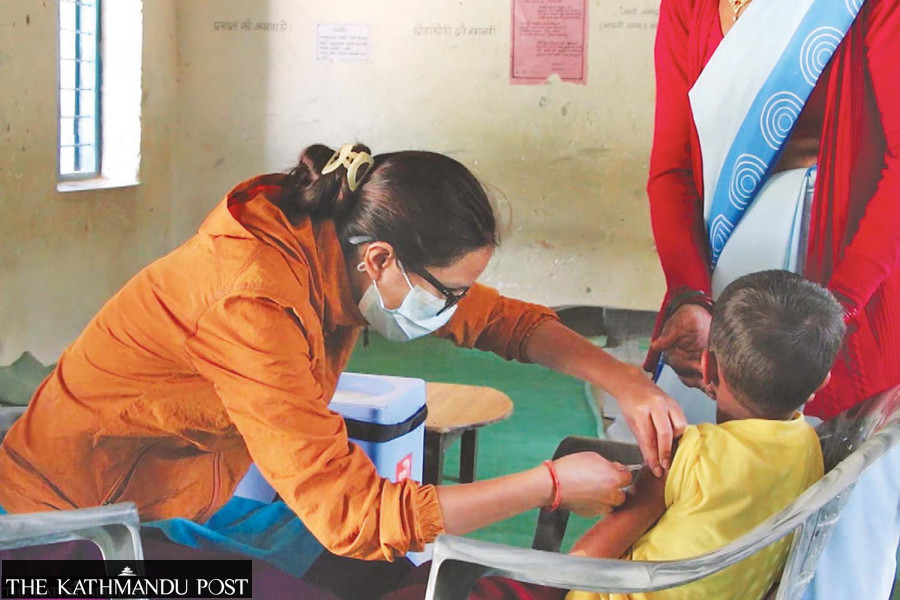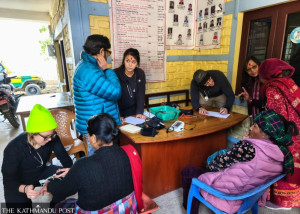Health
Measles-rubella campaign to be launched in 75 districts from February 25
Around 5.7 million children will be inoculated in the three-week long campaign.
Post Report
Around 5.7 million children from various age groups will be inoculated with the measles-rubella vaccine in a drive scheduled to start on February 25. The drive will be launched in 75 districts of the country.
The campaign has already been completed in Jajarkot and Rukum West, the two districts worst hit by the earthquake of magnitude 6.4 on November 3.
Children between nine months and 15 years from 24 high-risk districts will be inoculated with measles-rubella vaccine in the campaign, said Dr Abhiyan Gautam, chief of the Immunisation Section at the Family Welfare Division under the Department of Health Services. “The vaccine will be administered to children between nine months to five years of age from 51 districts,” he said.
Measles is a highly contagious viral disease transmitted through fluids from an infected person’s nose, mouth or throat. It can be potentially deadly for unvaccinated people.
Nepal had committed to eliminating measles by 2023 after missing the earlier deadline of 2019. To declare measles as eliminated, the number of cases should be less than five per 1 million people throughout the year.
However, the deadly virus was reported in over 14 districts across the country at the start of 2023. At least one child died and hundreds were infected with the disease last year.
According to Gautam, the 24 high-risk districts include 19 districts of the Tarai region bordering India and three of Kathmandu Valley. In June last year, Gokarneshwar of Kathmandu reported a measles outbreak. The outbreak was reported also in 2020 in some local levels of Lalitpur and Kathmandu, the capital city.
Gautam said that around 150,000 children between six months to five years in Jajarkot and West Rukum have been inoculated with the said vaccine.
Earlier, the National Immunisation Advisory Committee, an expert panel, had recommended the Health Ministry launch an additional vaccination drive in the quake-affected and high-risk districts. The expert group also suggested the authorities launch a drive against diseases such as measles and rubella, polio, cholera, pneumonia, and influenza.
At least 154 people died, hundreds were injured and thousands displaced by the magnitude 6.4 earthquake in Jajarkot and West Rukum districts of Karnali Province on November 3. Additionally, over 30 quake-displaced people lost their lives due to cold in the aftermath of the disaster.
“Necessary vaccine doses for the campaign have arrived and we are busy in the final preparation of the campaign,” said Gautam.
Officials at the Health Ministry said that the campaign will be launched in schools in the high-risk 24 districts and the campaign will be completed before the start of the Secondary Education Examination (SEE).
The vaccine doses have been supplied by the Global Alliance for Vaccine and Immunisation (GAVI).
Officials said that the campaign will be integrated, as some other vaccines—pentavalent, pneumococcal conjugate (PCV), and inactivated poliovirus (IPV)—will be administered to the children, who missed the vaccine doses in the routine programme.
The Health Ministry launches a nationwide measles-rubella campaign every four years to cover the children who missed the vaccine doses in the routine programme. Every year thousands of children miss the vaccine doses, as the coverage rate of the measles-rubella vaccine is below 90 percent.
“Over 95 percent of coverage rate is required to be eligible for elimination,” said Dr Shyam Raj Upreti, a child health expert. “Authorities concerned should do more to meet the elimination target.”
Measles and rubella are contagious viral diseases, which are transmitted through droplets from the nose, mouth or throat of infected persons. Early symptoms, which usually appear 10-12 days after infection, include high fever, runny nose, bloodshot eyes and white tiny spots inside the mouth. Several days later, a rash develops on the face, upper neck and other parts of the body.
Measles was once endemic in Nepal with an average 90,000 cases reported annually from 1994 to 2004.
The government launched a routine measles vaccination programme in the country in the late 1980s.
Although Nepal had committed to eliminating measles by 2019, the deadline was extended to 2023 due to frequent occurrences of the disease.
The Ministry of Health and Population has now extended the deadline for measles elimination to 2026.




 10.12°C Kathmandu
10.12°C Kathmandu













